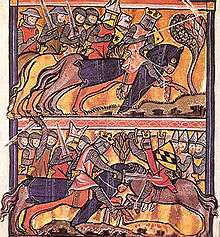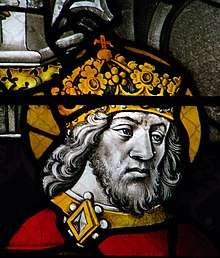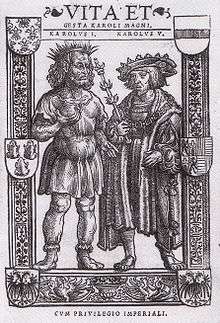Vita Karoli Magni
Vita Karoli Magni (Life of Charles the Great) is a biography of Charlemagne, King of the Franks and Holy Roman Emperor, written by Einhard.[1][2]


Literary context
Historians have traditionally described the work as the first example of a biography of a European king. The author tried to imitate the style of that of the ancient Roman biographer Gaius Suetonius Tranquillus, who is most famous for his Lives of the Caesars. Einhard's biography used especially the model of the biography of Emperor Augustus, the first emperor of the Roman Empire.[3]
Date
The date of the work is uncertain, and a number of theories have been put forward. The inclusion of Charlemagne's will at the end of the work makes it fairly clear that it was written after his death in 814. The first reference to the work, however, comes in a letter to Einhard from Lupus of Ferrieres, which is dated to the mid-9th century. Dates have been suggested ranging from about 817 to 833, usually based on interpretations of the text in the political context of the first years of the reign of Louis the Pious and Louis's attitude to his father.[4] No theory has yet emerged as an obvious frontrunner, and it is likely that debate will continue.
Author

Einhard's book is about intimate glimpses of Charlemagne's personal habits and tastes. He occupied a favoured position at Charlemagne's court so he had inside information. Einhard received advanced schooling at the monastery of Fulda sometime after 779. He was an exceptional student and was quite knowledgeable. The word was sent to Charlemagne of Einhard's expertise. He was then sent to Charlemagne’s Palace School at Aachen in 791. Einhard then received employment at Charlemagne's Frankish court about 796. He remained at this position for twenty some years. Einhard's book was expressly intended to convey his appreciation for advanced education. He wrote his biography after he had left Aachen and was living in Seligenstadt.[1]
Einhard and Charlemagne
Einhard's position while with Charlemagne was that of a modern minister of public works so he had intimate knowledge of his court. Einhard was also given the responsibility of many of Charlemagne's abbeys. It used to be suggested that Einhard's wife, Emma, was a daughter of Charlemagne; that can generally be disregarded as a twelfth-century fabrication, however, since there is no proof.[1]
Reliability
Most biographies of the Middle Ages related only good deeds of their subject, with many embellishments to improve their subject. Einhard's biography, however, is considered, for the most part, to be a trustworthy account of Charlemagne's life. It is considered an excellent account of earlier Medieval life.[1] Despite Einhard's limitations, since it was his first attempt at a major writing, the British historian Thomas Hodgkin said, "almost all our real, vivifying knowledge of Charles the Great is derived from Einhard, and that the Vita Karoli Magni is one of the most precious literary bequests of the early Middle Ages."[5]
Notes
- Ogg, p. 109
- Chisholm, Hugh, ed. (1911). . Encyclopædia Britannica. 9 (11th ed.). Cambridge University Press. p. 134.
- Southern, p. 1
- McKitterick, R. (2004). History and Memory in the Carolingian World. Cambridge: Cambridge University Press. p. 30. ISBN 978-0-521-53436-9.
- Hodgkin, p. 222
Sources
Translations
- Chiesa, P. Vita Karoli. Florence: SISMEL / Ed. del Galluzzo, 2014.
- Dutton, P. (1998). Charlemagne's Courtier: the Complete Einhard. Peterborough: Broadview Press. ISBN 978-1-55111-134-6.
- Firchow, Evelyn S.; Edwin H. Zeydel (1985). Vita Karoli Magni / The Life of Charlemagne. Saarbrücken: AQ-Verlag. ISBN 978-3-922441-49-6.
- Ganz, D. (2008). Two lives of Charlemagne / Einhard and Notker the Stammerer. London: Penguin. ISBN 978-0-14-045505-2.
- Grant, A.J. (1905). Early lives of Charlemagne / by Eginhard and the Monk of St Gall. London: Moring.
- Thorpe, L. (1969). Two lives of Charlemagne / by Einhard and Notker the Stammerer. Harmondsworth: Penguin. ISBN 0-14-044213-8.
Studies
- Ganz, D. (1997). "The Preface to Einhard's Vita Karoli". In H. Schefers (ed.). Einhard: Studien zu leben und Werk. Hessische Historische Kommission. pp. 299–310. ISBN 978-3-88443-033-0.
- Hodgkin, T. (1897). Charles the Great. London: Macmillan. ISBN 978-1-4067-3026-5.
- Holdsworth, C.J.; T.P. Wiseman (1986). The Inheritance of historiography, 350–900. Exeter: University of Exeter. ISBN 0-85989-272-7.
- Innes, M. (1996–1997). "The Classical Tradition and Carolingian Historiography: Encounters with Suetonius". International Journal of the Classical Tradition. 3 (3): 265–282. doi:10.1007/BF02686391.
- Kempshall, M. (1995). "Some Ciceronian Models for Einhard' s Life of Charlemagne". Viator. 26: 11–38. doi:10.1484/J.VIATOR.2.301133.
- Latowsky, Anne A. (2013). Emperor of the World: Charlemagne and the Construction of Imperial Authority, 800-1229. Ithaca, N.Y.–London: Cornell University Press.
- Ogg, F.A. (1907). A Source Book of Medieval History. New York: American Book Company.
- Nelson, J. (2005). "Charlemagne the Man". In J. Story (ed.). Charlemagne: Empire and Society. Manchester: Manchester University Press. ISBN 978-0-7190-7089-1.
- Southern, Pat (1998). Augustus. Routledge. ISBN 0-415-16631-4.
- Tischler, M. (2001). Einharts Vita Karoli : Studien zur Entstehung, Überlieferung und Rezeption (in German). Hannover: Hahnsche Buchhandlung. ISBN 3-7752-5448-X.
External links
| Wikisource has original text related to this article: |
- Full Latin text at the Latin Library
- Einhard. Life of Charlemagne at Project Gutenberg, translated by A.J. Grant